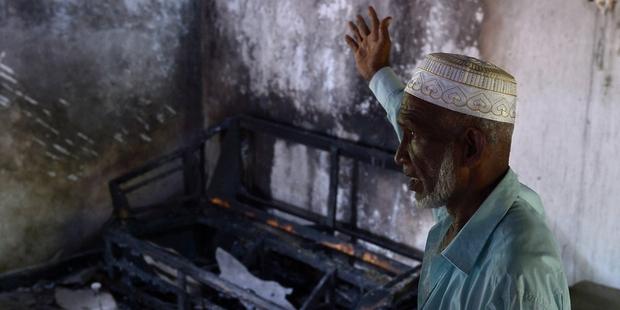
A Sri Lankan resident surveys the damage to a charred Muslim-owned home following clashes between Muslims and an extremist Buddhist group in the town of Alutgama.
Sri Lankan authorities must act immediately to end anti-Muslim violence in the country, and to rein in groups that violently target religious minorities, Amnesty International said.
At least four people have been reported killed and scores injured in the southern coastal towns of Aluthgama and Beruwala since an anti-Muslim riot broke out following a rally organized by the hard-line Buddhist group Bodu Bala Sena (BBS) on Sunday. Violent incidents have also been reported in other towns since Sunday.
“This is the worst outbreak of communal violence in Sri Lanka in years and there is a real risk of it spreading further. The government must do everything in its power to end it immediately, while respecting the human rights of all concerned. Those responsible for killings and other acts of violence must be held to account, and at-risk Muslim communities given the protection they need,” said David Griffiths, Amnesty International’s Deputy Asia Pacific Director.
“Eyewitness reports that police have stood by and refused to intervene in the violence are very troubling and must also be investigated. Security forces have a duty to protect the right of everyone to life and security regardless of their beliefs or identity.”
Despite police imposing a curfew, anti-Muslim mob violence continued over Monday and Tuesday, resulting in widespread destruction of property, with Muslims’ homes and shops burned and looted. Tensions had been rising in Aluthgama for days following an alleged fight between Muslim youths and a Buddhist monk’s driver.
But despite Muslim community leaders warning that the situation could escalate, the government granted BBS permission to stage the rally on Sunday that sparked the violence, apparently without putting in place the means to prevent or stop it.
“There has been a disturbing rise in attacks and harassment of religious minorities in Sri Lanka over the two past years, mostly led by groups with a hard-line Buddhist or nationalist agenda, and these groups are reported to have strong links to high-ranking government officials. Rising violence against religious minorities cannot be treated as an isolated issue – stopping it must be a crucial part of the national reconciliation that is so badly needed since the conflict’s end in 2009,” said David Griffiths.
Amnesty International received hundreds of reports of harassment, threats and attacks on Muslims and Christians and their places of worship in 2013.
After her August 2013 visit to Sri Lanka, UN High Commissioner for Human Rights Navi Pillay expressed concern at the “recent surge in incitement of hatred and violence against religious minorities”. These concerns were echoed by the UN Human Rights Council in March 2014 in the resolution that established an inquiry into alleged war crimes during Sri Lanka’s armed conflict.